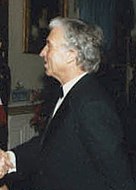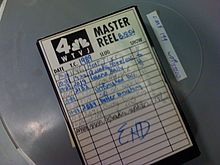1989 South Florida television affiliation switch
The event, referred to in contemporary media coverage as "The Big Switch",[1] was described as "Miami's own soap opera"[2] and at times compared to Dallas and Dynasty because of the lengthy public disputes between multiple parties that preceded it.
In West Palm Beach, WPEC picked up many new Broward County viewers for its CBS network programming but failed to lure them to its newscasts or surpass longtime market leader WPTV.
[8] Owned by Wometco Enterprises, a movie theater chain with diversified interests headed by Mitchell Wolfson,[9] WTVJ was a primary CBS affiliate but also carried programming from DuMont, ABC, and NBC during this period.
[47] After approving several measures in a shareholders meeting designed to prevent a hostile takeover,[46] the Wolfson family and Wometco board sold the company to merchant banker Kohlberg Kravis Roberts & Co. (KKR) on September 21, 1983, in a $1 billion leveraged buyout.
[63] Television and film production and syndication company Lorimar-Telepictures emerged as the buyer of WTVJ—along with Storer stations WAGA-TV, WITI, WJBK, WJW-TV, WSBK-TV and KCST—in a $1.85 billion group deal announced on May 21, 1986.
[60] This was initially attributed to Lorimar having issues financing the deal,[72] a weak advertising climate in Miami, and reduced cash flow estimates for WTVJ[73] that would have made it impossible to cover interest serviced on $2 billion in high-yield bonds raised by Adelson.
[75] The inquiry ended when Laurence Tisch, who took over as network chairman on September 10, 1986,[76][77] expressed worry over a station switch depressing the already slumping national ratings of the CBS Evening News.
[3][78] WTVJ general manager Alan Perris later claimed Tisch objected to Lorimar, who produced Dallas, Knots Landing and Falcon Crest for the network,[74] wanting to purchase a significant portion of the affiliate base and threatened to disaffiliate all of the CBS stations in the deal.
[83] KKR then offered WTVJ to both Capital Cities/ABC Inc. and NBC parent company General Electric (GE),[3] under the belief a competing network would not have their bids affected by a CBS disaffiliation threat,[79] internally referred to as "that Channel 6 card".
Notified shortly before noon,[15] Timothy recounted Ansin saying "You (expletive deleted)" at the news but honored a prior invite to lunch at a seafood restaurant on the 79th Street Causeway, picking up the tab.
No formal announcement was made to the WSVN staff that day beyond a terse internal memorandum,[89] with some staffers admitting to checking job openings in Broadcasting magazine amid a combination of anxiety and gallows humor.
[83] With WCIX's sale to TVX still pending, CBS expressed renewed interest in the station, telling the Herald they had been "talking to [Taft] for some time", which was interpreted as the network either indicating a WSVN affiliation was not possible or making a threat to pressure Ansin.
[93] Assisted by former WSVN operations manager and attorney Allen Sternberg,[15] Ansin retained former FCC commissioner Charles D. Ferris as his lead representation[88] and reached out to Rep. Dante Fascell[88] and Sen. Lawton Chiles[3] for additional lobbying.
[96] Ansin's petition to deny alleged NBC could induce WTVJ to liberally preempt popular CBS shows for lower-rated syndicated programming, disenfranchising Miami television viewers.
[106] The scheduling brinksmanship was not limited to CBS fare; in response to WPLG acquiring the rights to A Current Affair, WTVJ moved Wheel of Fortune to 7:30 p.m. directly opposite Jeopardy!
[102] Ansin's unwavering date was due to NBC's commitments with the 1988 Summer Olympics, the 1988 World Series,[106] and a majority of Miami Dolphins football games because of the network's AFC broadcast rights.
[109] Ansin made arrangements to fly to New York City on April 26 to sign a CBS contract at Black Rock when Malara called off the meeting, citing that they were reaching out to other parties regarding a purchase or affiliation.
[107] Initially bolstered by a verdict that awarded $3.5 million in damages to the owner of a former ABC station in Springfield, Missouri, after Capital Cities/ABC disaffiliated them[106]—which was later thrown out on appeal[113]—Ansin insisted the lawsuit would not hurt WSVN's chances regarding a network contract[111] even though talks between him and CBS never resumed.
[121] Moreover, the Taft purchase agreement was made 21 days before Grant Broadcasting System, owner of WBFS-TV, filed for Chapter 11 bankruptcy protection[80][122] as the result of excessive spending for syndicated programming and a softening advertising market.
[125] The company was to pay Salomon Brothers $200 million on January 1, 1988, and missed the first payment deadline, having been unable to lure investors to its junk bonds even before the Black Monday stock market crash in October 1987.
After fending off a hostile takeover attempt by Ted Turner in 1985, CBS was induced to sell KMOX-TV in St. Louis to the original iteration of Viacom for $122.5 million as part of a larger asset disposition plan.
[134] With that sale, a tax credit worth "tens of millions of dollars" was claimed[135] on the condition that CBS purchase another TV station by January 1, 1989; the network made an unsuccessful attempt to buy then-independent KPHO-TV in Phoenix earlier in 1988 from the Meredith Corporation.
[115] Steve Sonsky of the Miami Herald, critical of Ansin's prior legal battles and continued defiance, wrote: They're not going to become one of those independents that just runs back-to-back sitcom reruns... but that's the way all indie stations operate—because they've found that without the big original network programming as lead-ins and lead-outs, you just can't compete on the same level.
WPBF, meanwhile, was cited by media as a "dark horse" and by WPTV's general manager as a "sleeper" because of its proposed technical facilities and the track record of one of its owners, John C. Phipps, in running Tallahassee-area CBS affiliate WCTV, one of the most successful television stations in the country.
[157] By September, WSVN dropped its NewsCenter 7 branding for Channel 7 News and adopted an aggressive pressroom feel, with its early-evening newscasts reformatted into faster-paced, half-hour formats,[155] a move Cheatwood considered several months earlier.
[4] The FCC approved the sale of WCIX to CBS on October 31, 1988,[100] after The National Black Media Coalition withdrew a legal challenge following a favorable review of TVX's past Equal Employment Opportunity Commission compliance.
[166] WTVJ's $3 million marketing effort was dubbed "Operation Peacock", using NBC's star talent[167] and centered around a customized recording of the Bobby McFerrin single "Don't Worry, Be Happy".
[175] While WTVJ's marketing campaign for its switch to NBC was centered around the "don't worry, be happy" phrase, South Florida Sun-Sentinel critic Tom Jicha retrospectively wrote, "practically speaking, it was over as soon as it started.
[182] WTVJ started emphasizing crime stories and a tabloid presentation, similar to WSVN; the station also experienced frequent turnover in its lead anchor role, a situation that contrasted with Renick's 35-year tenure as its signature personality.
[189] While WCIX operated with reduced power during this period, reception improved dramatically among Broward County residents due to the temporary site being located at the Broward–Dade line, to the extent the rebuilt Homestead tower was considered a technical downgrade.




